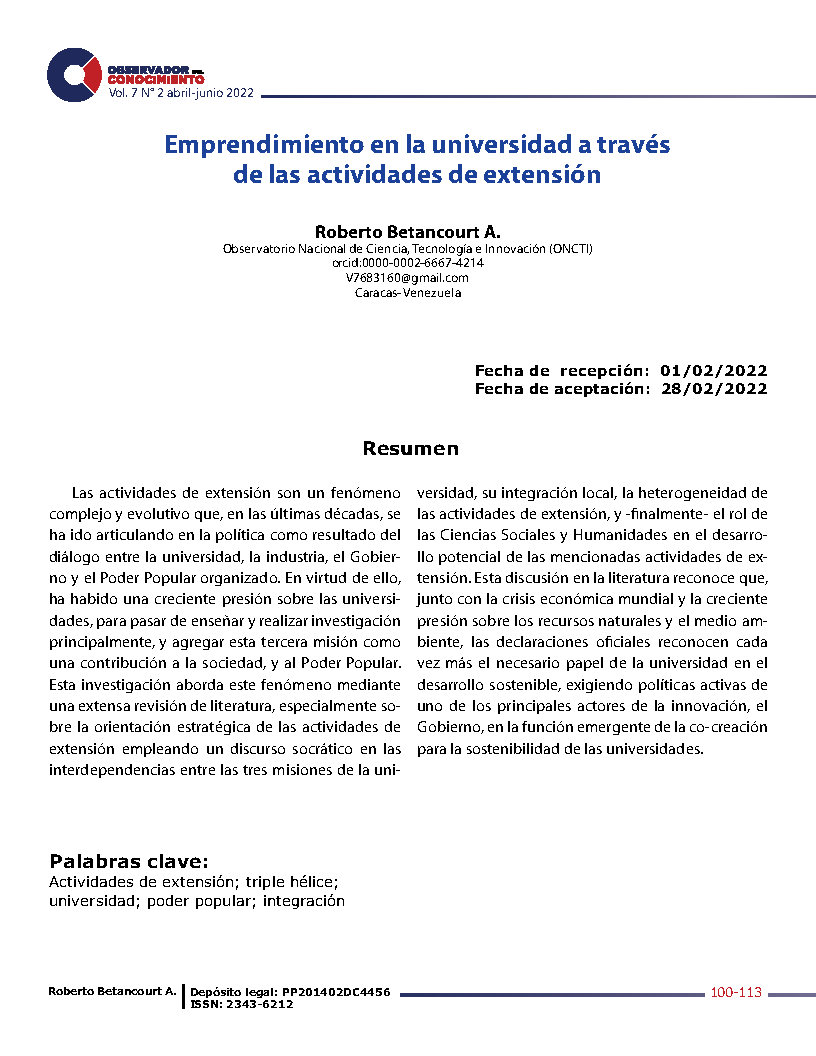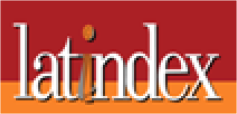University entrepreneurship through third stream activities
Keywords:
Thirs stream activities, triple helix, university, popular power, integrationAbstract
Third stream activities are a complex and evolving phenomenon that, in recent decades, has been articulated in politics as a result of the interactions between university, industry, Government and organised Popular Power. There has been a growing pressure on universities, to move from teaching and conducting research, to this third mission as a contribution to society, and to Popular Power. This research addresses this phenomenon through an extensive literature review, especially focus on the strategic orientation of third stream using a Socratic discourse on the interdependencies between these three missions of the university, its local integration the heterogeneity of extension activities, and, finally, the role of the Social Sciences and Humanities in the potential development of the aforementioned extension activities. This discussion in the literature recognises that, together with the world economic crisis, the growing pressure on natural resources and the environment, official declarations increasingly recognise the necessary role of the university in sustainable development, demanding active policies from one of the main actors of innovation, the Government, in the emerging role of co-creation for the sustainability of universities as a whole.
Downloads
References
Abreu, M.; Demirel, P.; Grinevich, V. y Karataş-Özkan,
M. (2016). Entrepreneurial practices in research-intensive and teaching-led universities. Small Bussines Economics. Volumen 47, pp. 695–717.
Adams, R.; Martin, S. y Boom, K. (2018). University culture and sustainability: designing and implementing an enabling framework. Journal of Cleaner Production. Volumen 171, pp. 434–445.
Agasisti, T.; Barra, C., y Zotti, R. (2019). Research, knowledge transfer, and innovation: the effect of Italian universities’ efficiency on local economic development 2006−2012”. Journal of Regional Science. Volumen 59(5), pp. 819-849.
Aragonés-Beltrán,P.; Poveda-Bautista, R., y Jiménez-Sáez, F. (2017). An in-depth analysis of a TTO's objectives alignment within the university strategy: an ANP-based approach. Journal of Engineering and Technology Management. Volumen 44, pp. 19–43.
Benneworth, P.; Pinheiro, R., y Sánchez-Barrioluengo,M. (2016). One size does not fit all! New perspectives on the university in the social knowledge economy. Science Public Policy. Volumen 43 (6), pp. 731–735.
Benneworth, P.; Young, M., y Normann, R. (2017). Between rigour and regional relevance? Conceptualising tensions in university engagement for socio-economic development. Higher Education Policy, Volumen 30 (4), pp. 443–462.
Betancourt, R. (2012). La investigación universitaria militar: integración de modos de producción de conocimiento y actores en tiempos de revolución. Caracas: Columnata.
Betancourt, R. (2016). El camino más largo. Caracas:Centro de Innovación para el Desarrollo.
Betancourt, R. (2018). Aplicación de metodologías para la medición de la investigación y la enseñanza. (sp).
Bortagaray, I. (2009). Bridging university and society in Uruguay: perceptions and expectations. Science and Public Policy, Volumen 36, pp. 115–119.
Brown, R. (2016). Mission impossible? Entrepreneurial universities and peripheral regional innovation systems. Industry and Innovation, Volumen 23 (2), pp. 189–205.
Carayannis, E. G. y Campbell, D.F. J. (2009). Mode 3” and “Quadruple Helix”: toward a 21st century fractal innovation ecosystem. International Journal of Technology Management, Volumen 46, No. 3, pp. 446, 201.
Cooper, D. (2017) “Concepts of “applied and public sociology”: arguments for a bigger theoretical picture around the idea of a “university third mission”.
De Francisco, M.J.V., Jiménez, M.T., del Pozo, P.C., y Nekhay, O. (2017). Evaluating impacts of university cooperation for development from the voice of the South. Rev. Econ. Mundial, Volumen 47, pp. 95–116.
De Jong, S., Barker, K., Cox, D., Sveinsdottir, T., y Van Den Besselaar, P. (2014). Understanding societal impact through productive interactions: ICT research as a case. ResearchEvaluation, Volumen 23 (2), pp. 89–102.
De La Torre, E.M., Agasisti, T., y Pérez-Esparrells, C. (2017). The relevance of knowledge transfer for universities’ effi-ciency scores: an empirical approximation on the Spanish public higher education system. ResearchEvaluation, Volumen 26 (3), pp. 211–229.
De La Torre, E.M., Casani, F., y Sagarra, M. (2015). Defining typologies of universities through a DEA-MDS analysis: an institutional characterisation for formative evaluation purposes. ResearchEvaluation, Volumen 27 (4), pp. 388–403.
De La Torre, E.M., Pérez-Esparrells, C., y Casani, F. (2018). The policy approach for the Third Mission of Universities: the Spanish Case (1983 – 2018). Reg. Sect. Econ. Stud. Volumen 18, pp. 13–33.
Di Berardino, D., y Corsi, C. (2018). A quality evaluation approach to disclosing third mission activities and intellectual capital in Italian universities. Journal of Intellectual Capital, Volumen 19 (1), pp. 178–201.
Etzkowitz, H. (1998). The norms of entrepreneurial science: cognitive effects of the new university–industry linkages. Research Policy, Volumen 27, pp. 823–833.
Etzkowitz, H. (2001). The second academic revolution and the rise of entrepreneurial science. IEEE Technology and Society Magazine, Volumen 20 (2), pp. 18–29.
Etzkowitz, H. (2003). Innovation in innovation: the triple helix of university-industry- government relations. Social Science Information, Volumen 42 (3), pp. 293–337.
Franzoni, C., y Lissoni, F. (2009). Academic entrepreneurs: critical issues and lessons for Europe”. En: Varga, A. (Ed.), “Universities and Regional Economic Development”. Edward Elgar, Aldershot.
Giuri, P., Munari, F., Scandura, A., y Toschi, L. (2019). The strategic orientation of universities in knowledge transfer activities. Technological Forecasting and Social Change, Volumen 138, pp. 261–278.
Gregersen, B., TvedLinde, L., y Gulddahl Rasmussen, J. (2009). Linking between Danish universities and society. Science and Public Policy, Volumen 36 (2), pp. 151-156.
Jäger, A., y Kopper, J. (2014). Third mission potential in higher education: measuring the regional focus of different types of HeIs. Review of Regional Research, Volumen 34 (2), pp. 95-118.
Journal of Applied Social Science, Volumen 11 (2), pp. 141–158.
Kriel, I. (2017). Engaging with homelessness in the City of Tshwane: ethical and practical considerations. Development Southern Africa, Volumen 34 (4), pp. 468– 481.
Kruss, G., Gastrow, M. (2017). Universities and innovation in informal settings: evidence from case studies in South Africa. Science and Public Policy, Volumen 44 (1), pp. 26–36.
Laredo, P. (2007). Revisiting the Third Mission of universities: toward a renewed categorisation of university activities? HigherEducationPolicy, Volumen 20 (4), pp. 441–456.
Ley de Universidades (1970). Gaceta Oficial República Bolivariana de Venezuela N° 1.429 de carácter extraordinario en fecha 8 de septiembre de 1970.
Ley Orgánica de Educación (2009). Gaceta Oficial de la República Bolivariana de Venezuela Nº 5.929 de carácter extraordinario en fecha 15 de agosto de 2009.
Mejlgaard, N., y Ryan, T.K. (2017). Patterns of third mission engagement among scientists and engineers. Research Evaluation, Volumen 26 (4), pp. 326–336.

Downloads
Published
How to Cite
Issue
Section
License
Copyright (c) 2022 http://creativecommons.org/licenses/by-nc-nd/4.0/

This work is licensed under a Creative Commons Attribution-NoDerivatives 4.0 International License.







